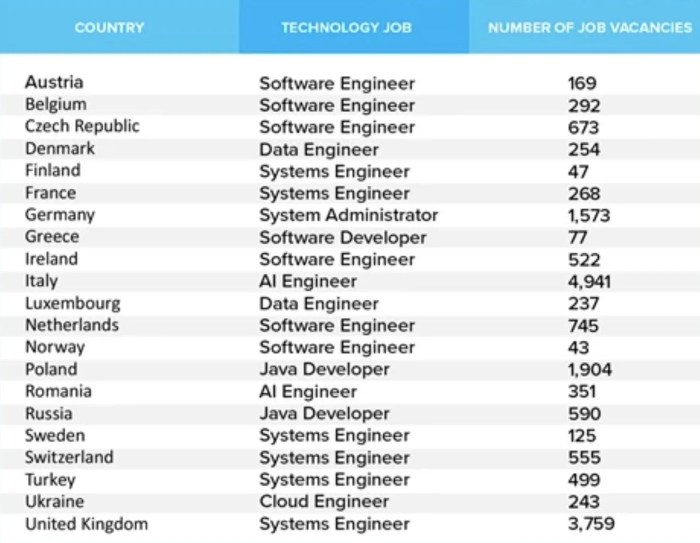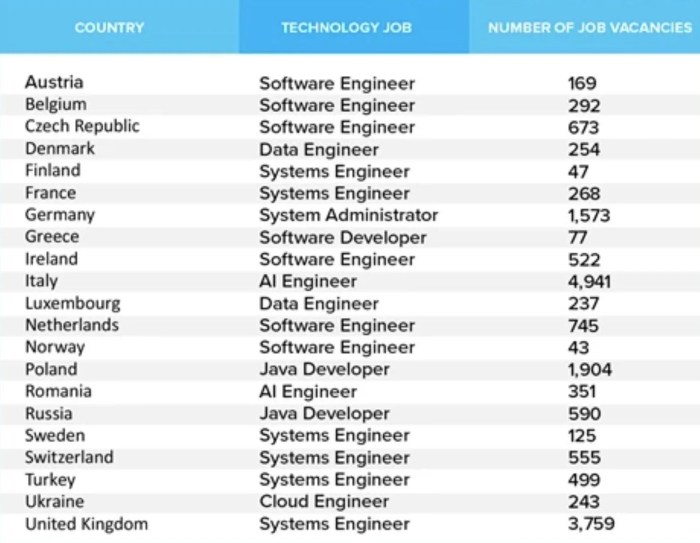Hottest jobs in european tech * – Hottest Jobs in European Tech: The European tech scene is buzzing with innovation and growth, creating a surge in demand for skilled professionals. From booming startups to established giants, companies are actively seeking talent to fuel their ambitious projects.
This dynamic landscape presents exciting opportunities for those looking to carve out a successful career in the tech industry.
This article will delve into the hottest jobs in European tech, exploring the skills, qualifications, and career paths that are in high demand. We’ll also discuss the impact of emerging technologies like AI, cloud computing, and cybersecurity on the job market, and how these trends are shaping the future of work in the region.
The European Tech Landscape

Europe is rapidly establishing itself as a global tech powerhouse, boasting a thriving ecosystem of innovation, talent, and investment. This dynamic landscape is characterized by a blend of established players and disruptive startups, shaping the future of technology across various sectors.
Key Trends and Growth Areas
Europe’s tech sector is experiencing significant growth, driven by several key trends.
- Artificial Intelligence (AI) and Machine Learning (ML):Europe is at the forefront of AI research and development, with leading institutions and companies pushing boundaries in areas such as natural language processing, computer vision, and robotics.
- Fintech:The European fintech scene is flourishing, with innovative solutions disrupting traditional financial services. From mobile payments and digital banking to alternative lending and investment platforms, Europe is leading the charge in financial technology.
- Sustainability Tech:With a growing focus on environmental sustainability, European tech companies are developing solutions to address climate change and resource management. This includes green energy technologies, sustainable transportation, and circular economy initiatives.
- HealthTech:Europe is a global leader in healthcare innovation, with a strong emphasis on digital health solutions. This includes telemedicine, personalized medicine, and medical devices.
- SpaceTech:Europe has a long history of space exploration and is now witnessing a surge in private sector investment in space technologies. From satellite communication and Earth observation to space tourism and asteroid mining, Europe is playing a key role in the future of space.
Major Tech Hubs in Europe
Europe is home to several thriving tech hubs, each with its unique strengths and specializations.
- London, UK:London is a global financial center and a leading hub for fintech, artificial intelligence, and cybersecurity. It is home to numerous startups, established tech companies, and venture capital firms.
- Berlin, Germany:Berlin is a hub for startups and tech companies, particularly in the areas of e-commerce, software development, and sustainability tech. It is known for its vibrant startup scene and supportive government policies.
- Paris, France:Paris is a center for innovation in artificial intelligence, cybersecurity, and digital media. It is home to several major tech companies, research institutions, and venture capital firms.
- Amsterdam, Netherlands:Amsterdam is a hub for fintech, e-commerce, and data analytics. It is known for its strong entrepreneurial ecosystem and its focus on sustainability.
- Stockholm, Sweden:Stockholm is a leading hub for gaming, mobile technology, and e-commerce. It is home to several successful tech companies, including Spotify and Skype.
Comparing the European Tech Ecosystem with Other Global Tech Hubs
The European tech ecosystem has its own unique characteristics that distinguish it from other global tech hubs.
- Strong Research and Development:Europe has a long history of scientific and technological innovation, with world-class research institutions and universities. This strong research base provides a foundation for technological advancements and the development of new technologies.
- Government Support:European governments are actively supporting the tech sector through initiatives, funding programs, and regulatory frameworks. This provides a supportive environment for startups and established companies to grow and thrive.
- Diverse Talent Pool:Europe is home to a diverse and highly skilled workforce, with a strong emphasis on STEM education. This provides a rich talent pool for tech companies to recruit from.
- Focus on Sustainability:Europe is at the forefront of the global movement towards sustainability, and this is reflected in the tech sector. Many European tech companies are developing solutions to address climate change and resource management.
Emerging Technologies Driving Job Demand

The European tech landscape is being reshaped by a wave of emerging technologies, creating a surge in demand for skilled professionals. AI, cloud computing, and cybersecurity are driving this transformation, opening up new job opportunities and shaping the future of work in the region.
Impact of Emerging Technologies on the European Tech Job Market
These technologies are fundamentally altering the way businesses operate and interact with customers, leading to a significant increase in the demand for tech professionals with specialized skills. This impact is evident in several key areas:
- Increased Demand for Specialized Skills:The adoption of AI, cloud computing, and cybersecurity requires a workforce with specialized knowledge and expertise in these areas. This has led to a surge in demand for professionals with skills in machine learning, data science, cloud architecture, cybersecurity engineering, and ethical hacking.
- Creation of New Job Roles:Emerging technologies are not only driving demand for existing roles but also creating entirely new job categories. Examples include AI trainers, data analysts, cloud security architects, and cybersecurity consultants.
- Transformation of Traditional Roles:The integration of these technologies is transforming traditional job roles, requiring professionals to adapt and acquire new skills. For instance, software developers are now expected to have a strong understanding of cloud computing principles, while marketing professionals are increasingly utilizing AI-powered tools for data analysis and campaign optimization.
Specific Job Roles Emerging Due to AI, Cloud Computing, and Cybersecurity
The rapid adoption of these technologies has created a diverse range of new job roles, reflecting the growing complexity and sophistication of the tech landscape.
AI-Driven Job Roles
The increasing use of AI across industries has led to the emergence of specialized roles focused on developing, deploying, and managing AI solutions.
- AI Trainer:Responsible for training and fine-tuning AI models to achieve optimal performance. This involves providing large datasets and feedback to the models to improve their accuracy and efficiency.
- Machine Learning Engineer:Develops and implements machine learning algorithms to solve specific business problems. They are involved in data preprocessing, model selection, training, and deployment.
- AI Ethics Specialist:Ensures the responsible and ethical development and deployment of AI systems. This role involves identifying and mitigating potential biases, ensuring transparency, and upholding privacy principles.
Cloud Computing Job Roles
The shift towards cloud-based infrastructure has created a demand for professionals with expertise in cloud architecture, management, and security.
- Cloud Architect:Designs, implements, and manages cloud infrastructure solutions. They work with businesses to understand their requirements and create scalable and secure cloud environments.
- Cloud Security Engineer:Responsible for securing cloud infrastructure and data. They implement security controls, monitor for threats, and ensure compliance with industry standards.
- Cloud DevOps Engineer:Bridges the gap between development and operations by automating cloud infrastructure management and deployment processes. They work to streamline workflows and improve efficiency.
Cybersecurity Job Roles
The increasing sophistication of cyberattacks has led to a growing need for cybersecurity professionals with specialized skills in threat detection, prevention, and response.
- Cybersecurity Analyst:Monitors networks and systems for security breaches, analyzes suspicious activity, and responds to incidents. They are responsible for identifying and mitigating vulnerabilities.
- Ethical Hacker:Simulates real-world cyberattacks to identify vulnerabilities in systems and networks. They use their expertise to help organizations improve their security posture.
- Security Architect:Designs and implements security frameworks and policies for organizations. They work to ensure that systems and data are protected from threats.
Skills in Demand for European Tech Professionals
The European tech landscape is dynamic and competitive, demanding a specialized skillset to thrive. Companies are actively seeking professionals who can navigate the complexities of emerging technologies and contribute to innovation. This section delves into the most sought-after skills for European tech professionals, encompassing both technical and soft skills.
Technical Skills
Technical skills are the foundation of success in the tech industry. Employers seek individuals with proficiency in various programming languages, frameworks, and technologies. The demand for these skills is driven by the constant evolution of the tech landscape, necessitating continuous learning and adaptation.
Browse the implementation of uk built satellite help combat the climate crisis in real-world situations to understand its applications.
- Programming Languages:Proficiency in popular programming languages such as Python, Java, JavaScript, C++, and C# is highly valued. These languages are widely used in web development, data science, mobile app development, and other areas.
- Cloud Computing:Expertise in cloud platforms like AWS, Azure, and Google Cloud is essential for managing and deploying applications, storing data, and leveraging cloud-based services.
- Data Science and Analytics:Skills in data analysis, machine learning, and artificial intelligence are increasingly sought after as organizations leverage data to gain insights and make informed decisions.
- Cybersecurity:With the growing threat of cyberattacks, professionals with expertise in cybersecurity, including ethical hacking, penetration testing, and incident response, are in high demand.
- DevOps:DevOps practices combine development and operations to streamline software development and deployment processes. Professionals with DevOps skills are crucial for building and maintaining efficient and reliable systems.
Soft Skills
While technical skills are crucial, soft skills are equally important for success in the tech industry. These skills enable effective communication, collaboration, and problem-solving, fostering a positive and productive work environment.
- Communication:Strong communication skills are essential for conveying technical concepts clearly and effectively to colleagues, clients, and stakeholders.
- Collaboration:The ability to work effectively in teams, share knowledge, and contribute to collaborative projects is highly valued in the tech industry.
- Problem-Solving:Tech professionals are expected to identify and solve complex problems, requiring analytical thinking, critical reasoning, and creative solutions.
- Adaptability:The tech landscape is constantly evolving, requiring professionals to be adaptable and embrace new technologies and approaches.
- Leadership:Tech professionals with leadership qualities are sought after to guide teams, inspire innovation, and drive projects forward.
Importance of Continuous Learning and Upskilling
The tech industry is characterized by rapid innovation and advancements. To remain competitive and relevant, professionals must engage in continuous learning and upskilling. This involves staying abreast of emerging technologies, acquiring new skills, and enhancing existing knowledge.
“Continuous learning is not just about keeping up with the latest trends; it’s about staying ahead of the curve.”
Anonymous
Resources and Programs for Upskilling
Numerous resources and programs are available to support tech professionals in their upskilling journey. These resources provide access to online courses, bootcamps, certifications, and mentorship opportunities.
- Online Learning Platforms:Platforms like Coursera, Udemy, and edX offer a wide range of courses covering various tech topics, from programming languages to data science and cloud computing.
- Bootcamps:Coding bootcamps provide intensive training in specific tech skills, equipping individuals with the practical knowledge and experience required for entry-level roles.
- Professional Certifications:Industry-recognized certifications, such as AWS Certified Solutions Architect or Microsoft Azure Solutions Architect, validate technical expertise and enhance career prospects.
- Mentorship Programs:Mentorship programs connect experienced professionals with aspiring individuals, providing guidance, support, and career advice.
Career Paths and Opportunities
The European tech sector offers a diverse range of career paths, catering to various skill sets and interests. From entry-level roles to senior management positions, there are numerous opportunities for growth and advancement within the industry.
Entry-Level Roles
Many entry-level roles are available in European tech, providing a foundation for aspiring professionals to gain valuable experience and build their careers.
- Software Developer:This role involves writing, testing, and maintaining software applications. Entry-level software developers typically focus on specific programming languages and technologies, such as Java, Python, or JavaScript.
- Data Analyst:Data analysts collect, clean, and analyze data to identify trends and insights.
Entry-level positions often involve working with data visualization tools and reporting on key performance indicators.
- Cybersecurity Analyst:Cybersecurity analysts are responsible for protecting computer systems and networks from cyber threats. Entry-level roles often involve monitoring security systems, responding to incidents, and conducting vulnerability assessments.
- UX/UI Designer:UX/UI designers create user-friendly and aesthetically pleasing interfaces for websites and applications. Entry-level roles typically involve designing wireframes, prototypes, and visual elements.
Mid-Level Roles
As professionals gain experience and develop their skills, they can advance to mid-level roles with greater responsibilities and autonomy.
- Senior Software Developer:Senior software developers lead development teams, mentor junior developers, and design and implement complex software solutions.
- Data Scientist:Data scientists apply advanced statistical and machine learning techniques to analyze large datasets and extract meaningful insights. They often work on projects involving predictive modeling, natural language processing, and computer vision.
- Security Engineer:Security engineers design, implement, and maintain security systems to protect organizations from cyber threats. They often specialize in areas such as network security, application security, or cloud security.
- Product Manager:Product managers are responsible for defining, developing, and launching new products or features.
They work closely with engineering, design, and marketing teams to ensure product success.
Senior-Level Roles, Hottest jobs in european tech *
Senior-level roles in European tech require extensive experience, leadership skills, and a deep understanding of the industry.
- Chief Technology Officer (CTO):CTOs are responsible for the overall technology strategy and direction of an organization. They oversee technology development, infrastructure, and innovation.
- Head of Data:Heads of Data lead data science teams, develop data strategies, and ensure data quality and integrity.
- Chief Information Security Officer (CISO):CISOs are responsible for the security of an organization’s information systems and data.
They develop and implement security policies, manage security risks, and ensure compliance with regulations.
- Vice President of Engineering:Vice Presidents of Engineering lead large engineering teams, manage technology budgets, and oversee product development.
Networking and Building Connections
Networking is crucial for career success in European tech. Attending industry events, joining professional organizations, and connecting with professionals on LinkedIn are essential for staying informed about industry trends, identifying job opportunities, and building relationships that can lead to career advancement.
Challenges and Opportunities for European Tech: Hottest Jobs In European Tech *
The European tech sector faces both challenges and opportunities as it navigates the dynamic global landscape. While talent shortages and competition from global giants pose significant hurdles, Europe’s strengths in innovation, data privacy, and sustainability offer pathways for growth and success.
Talent Shortages and Competition
Europe’s tech sector is grappling with a persistent talent shortage. The demand for skilled professionals far outpaces the supply, hindering the growth and competitiveness of European tech companies. This shortage is exacerbated by competition from global tech giants like Google, Amazon, and Facebook, which offer higher salaries and more attractive benefits.
- A 2023 study by the European Commission found that 70% of European tech companies reported difficulties in finding qualified personnel.
- The average salary for a software engineer in the United States is significantly higher than in Europe, making it challenging for European companies to retain top talent.
Opportunities for Growth and Innovation
Despite the challenges, Europe possesses several key strengths that can drive growth and innovation in the tech sector. These include:
- Strong focus on research and development:Europe has a long tradition of excellence in scientific research, fostering a vibrant ecosystem of universities, research institutions, and startups.
- Commitment to data privacy:The General Data Protection Regulation (GDPR) has established Europe as a leader in data protection, attracting companies seeking a more ethical and secure environment for data processing.
- Growing interest in sustainability:Europe is at the forefront of the global movement towards sustainability, with a strong emphasis on green technology and environmental responsibility.
Leveraging Strengths for Global Competitiveness
European tech companies can leverage their strengths to compete effectively on a global scale by:
- Investing in talent development:Companies can invest in training programs, apprenticeships, and scholarships to develop a pipeline of skilled tech professionals.
- Collaborating with research institutions:Partnerships with universities and research institutions can provide access to cutting-edge technologies and talent pools.
- Focusing on niche markets:European companies can focus on specialized areas where they have a competitive advantage, such as sustainability, healthcare, or fintech.
- Promoting a strong ethical framework:Europe’s commitment to data privacy and ethical AI can be a key differentiator for attracting customers and investors.





